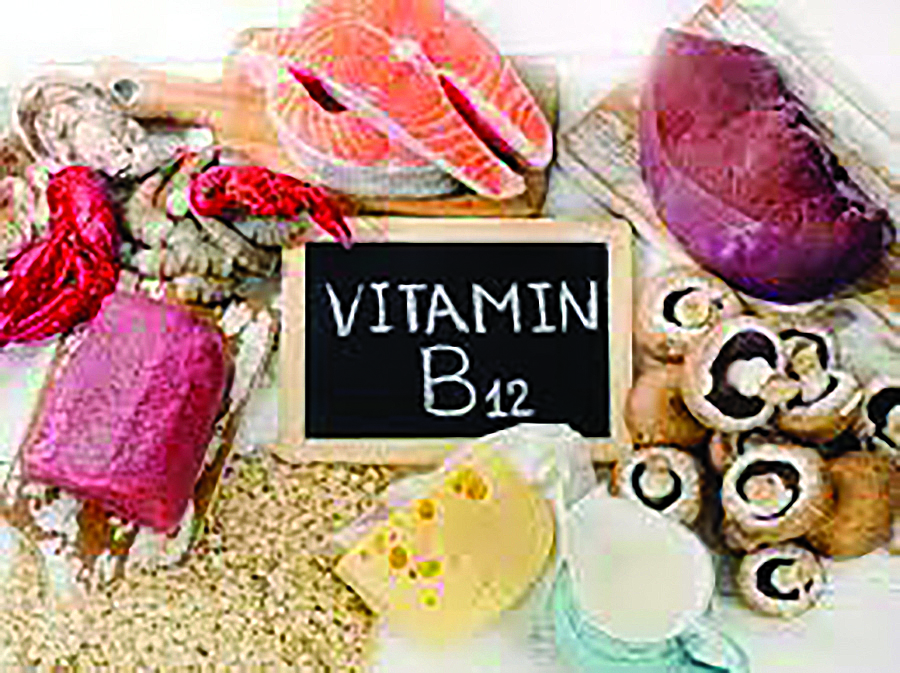Vitamins are the unsung heroes of our nutritional needs. Vitamin B12 often takes centre-stage in discussions about health and vitality. Referred to as the ‘energy vitamin’, B12 plays a vital role in numerous physiological processes key to maintaining our overall well-being.
Vitamin B12, also known as cobalamin, is a water-soluble vitamin belonging to the B-complex family. It’s unique among vitamins due to the presence of the mineral cobalt, essential to proper functioning of various bodily processes, including the formation of red blood cells, neurological functions, and the synthesis of DNA (protects from mutations that can cause cancer).
MARVELS OF OF VITAMIN B12:
Red Blood Cell Formation: A primary function of Vitamin B12 is to aid in the formation of red blood cells. Without adequate B12, red blood cells become larger and more fragile, leading to a condition known as megaloblastic anaemia, which causes fatigue, weakness, and an overall lack of energy.
Neurological Health: Vitamin B12 is essential for maintaining a healthy nervous system. It helps in the formation of the protective myelin sheath around nerve cells, promoting proper nerve function. Deficiency in B12 can lead to neurological issues, including numbness, tingling, and even cognitive impairments in severe cases.
DNA Synthesis: Vitamin B12 is involved in the synthesis of DNA, the genetic material in our cells. This is crucial for cell division and overall growth and development.
Homocysteine Regulation: B12, in combination with other B-vitamins, helps regulate homocysteine levels in the blood. Elevated homocysteine levels have been associated with an increased risk of cardiovascular disease.
Energy Production: While B12 doesn’t directly provide energy, it plays a pivotal role in converting food into energy. It helps metabolise fats and carbohydrates, ensuring the body efficiently utilizes its energy sources.
SOURCES OF VITAMIN B12
The primary dietary sources of Vitamin B12 are animal-based foods, including Meats (lamb, mutton, beef, pork and poultry); Fish (salmon, trout, tuna, and other seafood); Dairy Products (milk, cheese, and yogurt) and eggs, particularly the yolk.
For vegetarians and vegans, obtaining sufficient B12 can be challenging, as plant-based foods are generally poor sources of this vitamin. In such cases, fortified foods like plant-based milk alternatives, and nutritional yeast can provide an alternative source of B12. However, supplementation may be necessary to meet daily requirements for those following strict vegan diets.
RECOMMENDED DAILY INTAKE:
The recommended daily intake of Vitamin B12 depends on age and life-stage. Generally, the Recommended Dietary Allowance (RDA) for B12 is as follows:
- Infants (0-12 months): 0.4-2.8 micrograms (mcg)
- Children (1-18 years): 1.2-2.4 mcg
- Adults: 2.4 mcg
- Pregnant and lactating women: 2.6-2.8 mcg
It’s important to note that the body’s ability to absorb B12 decreases with age, making supplementation or increased dietary intake crucial for older adults.
CONSEQUENCES OF B12 DEFICIENCY:
A deficiency in Vitamin B12 can have serious health consequences. Common symptoms of deficiency include fatigue, weakness, anaemia, numbness and tingling, cognitive difficulties, mood disturbances, difficulty walking and balance problems.
If left untreated, a B12 deficiency can lead to severe and irreversible neurological damage. It’s crucial to address deficiencies promptly through dietary changes and, in some cases, B12 supplements.
When Do You Need B12 Supplements?
While many of us can obtain our daily dose of this vital vitamin through a balanced diet, there are circumstances when supplements are important:
Vegans and Vegetarians: If you’ve embarked on the path of a plant-based diet, your B12 intake may be insufficient. To bridge the gap, consider supplements to ensure you don’t miss out on this essential nutrient.
Aging Gracefully: As we age, our bodies become less efficient at absorbing B12 from food. Therefore, seniors may benefit from B12 supplements to maintain their vitality and cognitive function.
Gastrointestinal Challenges: Certain gastrointestinal conditions, such as pernicious anaemia or celiac disease, can impair B12 absorption. In such cases, supplements offer a lifeline.
Medical Necessity: Some medications, like proton pump inhibitors and metformin, can interfere with B12 absorption. If you’re taking these drugs for chronic conditions, consult your healthcare provider to determine if supplements are necessary.
The Supplement Dilemma: When considering B12 supplements, it’s important to understand the options available. There are two main forms: CYANOCOBALAMIN – this synthetic form of B12 is effective for most people, widely available and generally less expensive; and METHYLCOBALAMIN – this natural form of B12 is more bioactive and may be better absorbed by the body. It’s a popular choice for those who want to maximize B12 benefits.
HOW TO CHOOSE YOUR B12 SUPPLEMENT
When selecting a B12 supplement, keep the following tips in mind:
Consult A Healthcare Professional: Before adding any supplement to your regimen, consult your healthcare provider who will advise you on the right dosage, frequency and form (including pills, sublingual tablets, and injections), for your specific needs based on your age, dietary choices, and health conditions.
Quality Matters: Opt for reputable brands and look for third-party testing to ensure the purity and accuracy of the supplement.
Remember, a balanced diet rich in animal products, fortified foods, and supplements, when necessary, can help you harness the marvels of Vitamin B12 and keep your energy levels high, your nerves healthy, and your blood cells vibrant. In the quest for optimal health and vitality, never underestimate the power of this remarkable vitamin. Embrace the marvels of Vitamin B12 and experience the difference it will make to your life!
- Healing or Harmful? - 15 March2025
- The Parsi Woman’s Guide To Superfoods For Hormonal Health - 8 March2025
- Strengthen Your Constitution This Republic Day! - 25 January2025
